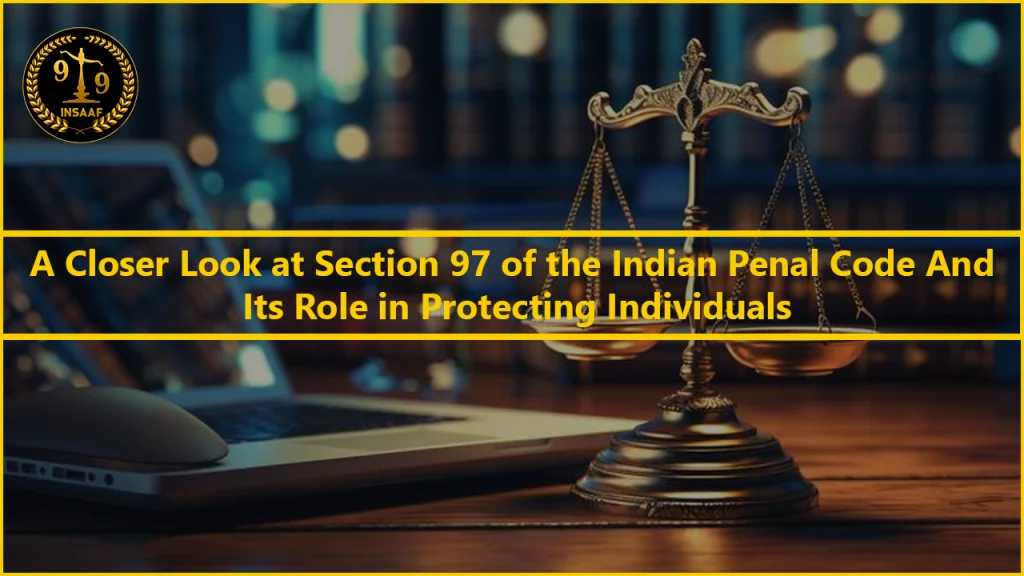

Online Legal Advice from Insaaf99® Online Lawyer Consultation in India


Online Legal Advice from Insaaf99® Online Lawyer Consultation in India

Right to private defense is an important provision under the law specifically in those situations where an individual or his or her property is put under imminent danger and they are not in a situation to reach out to law-keeping authorities. The Indian Law allows its citizens the right to private defense enabling them to defend themselves, other person or private property in the situation where they are threatened to death or put under imminent danger. The right to private defense is very important for every citizen and it also helps in building a fair and just society. In this article we will delve deep to understand various aspects of the right to private defense under section 97.
Let us understand the provision of private defense as mentioned under section 97 IPC. As per the section 97 of Indian Penal Code
Every person has a right, subject to the restrictions contained in section 99, to defend:
In brief section 97 IPC allows individuals to protect their own body or other against any gruesome attack that can affect the human body. The individuals also have the right to defend their property if there is a direct threat of theft, robbery, mischief and criminal trespass.
Also Read :- Anticipatory Bail Demystified: Insaaf99’s Commitment to Individual Rights
Right to private defense mentioned under IPC section 97 comes with some restrictions and these restrictions are outlined in section 99 of the IPC.
The right to private defense is not applied when the act is committed by a public servant for the purpose of law keeping or the act is carried out by a person under the direction of a public servant as per the requirement of the law. Below are some of the situations where provision to private defense can not be invoked.
There are certain caveats attached to the act committed by public servants to bypass the right to private defense as their authority is not absolute.
The act or the action of the public servant must have reasonable ground and should not be performed illegally or under any abuse of power.

The role of a legal expert becomes very important legal matters specifically when it is related to criminal cases. Most of the time individuals involved are not aware of their rights, the limited knowledge of law in legal matters make them vulnerable. Moreover the stakes in criminal cases are very high, a person faces the threat of being incarcerated, even death penalty for severe crime. Having a criminal record can hurt the future prospect of the individual as it badly affects the professional and personal matters. This makes the involvement of a legal expert very important in criminal cases. Similarly in IPC section 97 cases having the services of a legal expert brings various advantages to the table.
A legal expert help you in following ways matters related to crime under section 97 IPC
Having an adept criminal lawyer by your side is very important considering the nature of legal complexity involved in these cases. When the crime is as serious as under section 97 IPC and stakes are really high, having an experienced legal expert helps a lot. You can easily find the best criminal lawyer by using the services of online legal consultation platform Insaaf99.
Insaaf99 an innovative online legal consultation platform empowers individuals with legal concern by providing expert advice online. The individuals seeking legal help in IPC 97 cases can receive expert legal guidance by connecting with an adept lawyer online and get help in creating legal strategies for defense, understanding legal procedure and rights. Insaaf99 bridges gap to legal consultation access by using technology and offering instant access to legal insight to help navigate legal complexities involved with IPC Section 97 cases.
Conclusion: The right to private defense allowed to Indian citizens under IPC section 97 enables individuals to protect themselves, others and private property when put under gruesome attacks. However, the privilege comes with certain responsibility and has to be exercised cautiously, as the right to private defense is not an outright privilege; it comes with certain restrictions to limit the abuse of the power.